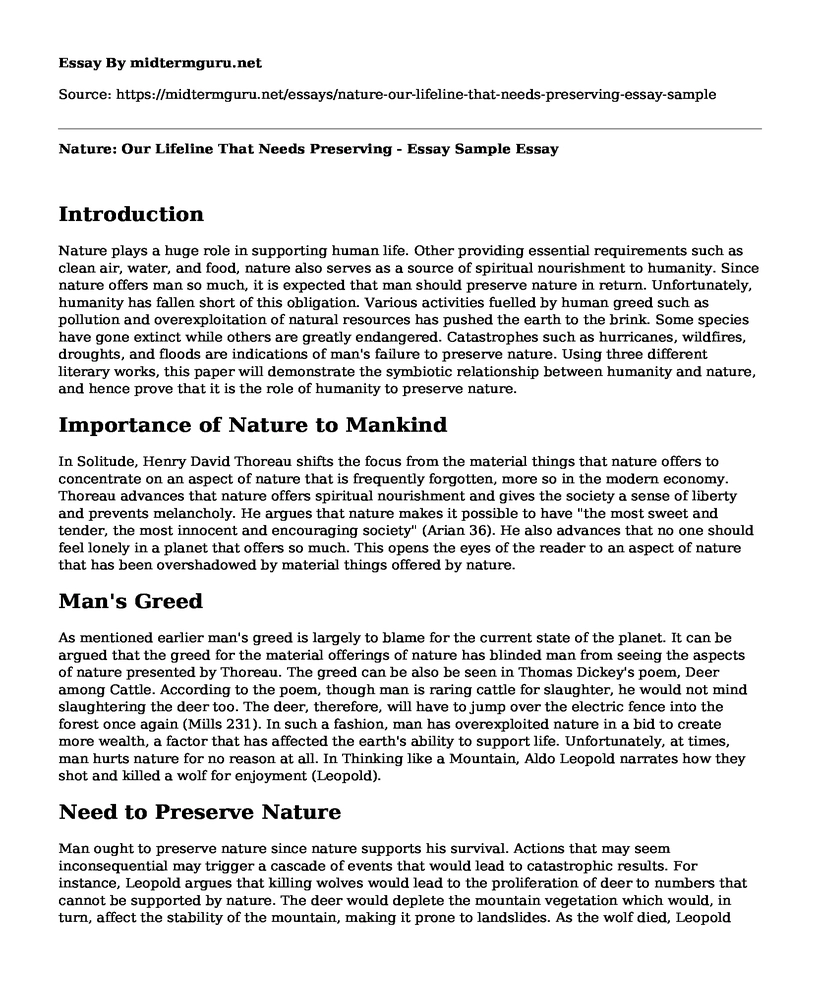Introduction
Nature plays a huge role in supporting human life. Other providing essential requirements such as clean air, water, and food, nature also serves as a source of spiritual nourishment to humanity. Since nature offers man so much, it is expected that man should preserve nature in return. Unfortunately, humanity has fallen short of this obligation. Various activities fuelled by human greed such as pollution and overexploitation of natural resources has pushed the earth to the brink. Some species have gone extinct while others are greatly endangered. Catastrophes such as hurricanes, wildfires, droughts, and floods are indications of man's failure to preserve nature. Using three different literary works, this paper will demonstrate the symbiotic relationship between humanity and nature, and hence prove that it is the role of humanity to preserve nature.
Importance of Nature to Mankind
In Solitude, Henry David Thoreau shifts the focus from the material things that nature offers to concentrate on an aspect of nature that is frequently forgotten, more so in the modern economy. Thoreau advances that nature offers spiritual nourishment and gives the society a sense of liberty and prevents melancholy. He argues that nature makes it possible to have "the most sweet and tender, the most innocent and encouraging society" (Arian 36). He also advances that no one should feel lonely in a planet that offers so much. This opens the eyes of the reader to an aspect of nature that has been overshadowed by material things offered by nature.
Man's Greed
As mentioned earlier man's greed is largely to blame for the current state of the planet. It can be argued that the greed for the material offerings of nature has blinded man from seeing the aspects of nature presented by Thoreau. The greed can be also be seen in Thomas Dickey's poem, Deer among Cattle. According to the poem, though man is raring cattle for slaughter, he would not mind slaughtering the deer too. The deer, therefore, will have to jump over the electric fence into the forest once again (Mills 231). In such a fashion, man has overexploited nature in a bid to create more wealth, a factor that has affected the earth's ability to support life. Unfortunately, at times, man hurts nature for no reason at all. In Thinking like a Mountain, Aldo Leopold narrates how they shot and killed a wolf for enjoyment (Leopold).
Need to Preserve Nature
Man ought to preserve nature since nature supports his survival. Actions that may seem inconsequential may trigger a cascade of events that would lead to catastrophic results. For instance, Leopold argues that killing wolves would lead to the proliferation of deer to numbers that cannot be supported by nature. The deer would deplete the mountain vegetation which would, in turn, affect the stability of the mountain, making it prone to landslides. As the wolf died, Leopold realized that "there was something in those eyes only known to the wolf and the mountain" (Leopold). Similarly, humanity must realize that their activities, though seemingly inconsequential, affect ecosystems and ultimately affect the planet's ability to support life.
Conclusion
Since man depends heavily on nature, he must support it. Unfortunately, humanity has not fulfilled this duty. Overexploitation of natural resources and pollution has pushed the planet to the edge. Such activities are driven by the greed for economic growth while others, such as the killing of the wolf by Leopold and his friends, are done just for enjoyment. Just like Leopold did, humanity must realize that human activities have far-reaching consequences on nature and genuine efforts must be targeted at preservation of nature.
Works Cited
Arian, Ali. "The elements of humanity and Sufism in Henry David Thoreau's Walden." Ars Aeterna 7.1 (2015): 35-40. <https://www.degruyter.com/downloadpdf/j/aa.2015.7.issue-1/aa-2015-0005/aa-2015-0005.xml>.
Leopold, Aldo. Thinking Like A Mountain. Lone Goose Press, 1990. <http://www.northallegheny.org/cms/lib4/PA01001119/Centricity/Domain/1282/Population%20Ecology%20Packet.docx>.
Mills, Ralph J. "The Poetry of James Dickey." Triquarterly 11 (1968): 231. <http://search.proquest.com/openview/4ec8ec915bc9cd0ffbb7017c541f7fc0/1?pq-origsite=gscholar&cbl=1817081>.
Cite this page
Nature: Our Lifeline That Needs Preserving - Essay Sample. (2023, Jan 17). Retrieved from https://midtermguru.com/essays/nature-our-lifeline-that-needs-preserving-essay-sample
If you are the original author of this essay and no longer wish to have it published on the midtermguru.com website, please click below to request its removal:
- Paper Example on Institutional Discrimination
- Paper Example on Ageism in America
- Sexting, Texting, Cyberbullying and Keeping Youth Safe Online - Article Analysis Essay
- Essay Sample on Alcohol Addiction
- Global Warming: Becoming Mindful of Environmental Issues & Solutions - Essay Sample
- Driverless Cars: A Solution to Global Warming? - Essay Sample
- "Rude Teens Berate Parents While at a Sneakers Store" by What Would You Do?







